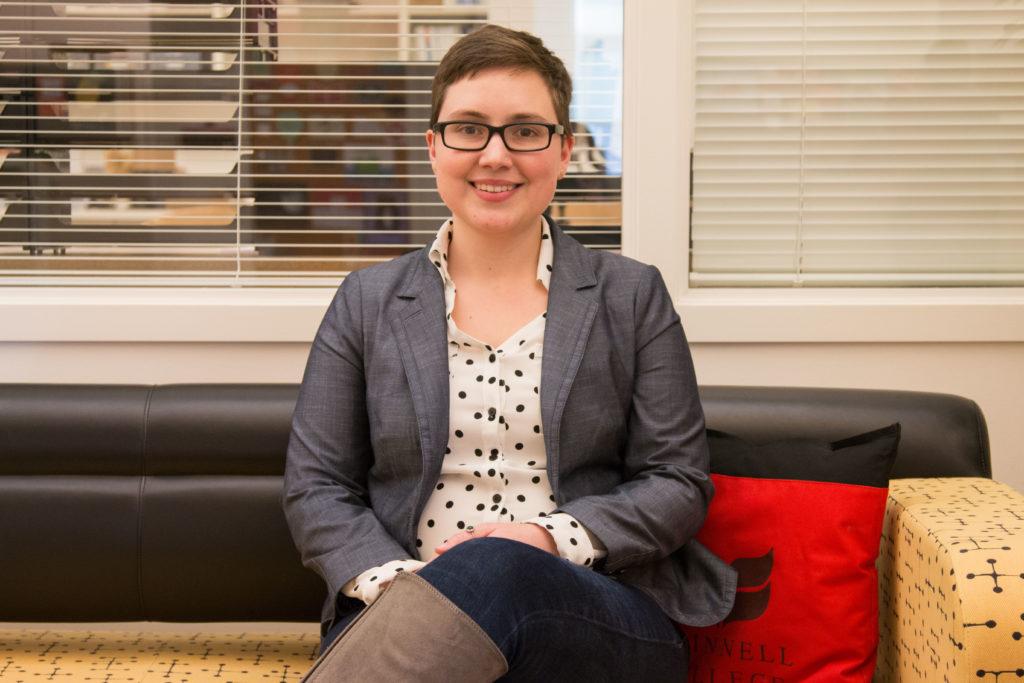
Autumn Wilke will serve as Grinnell’s new Assistant Dean for Disability Resources, taking on part of the role vacated by Jennifer Krohn’s retirement and continuing her work on disability and accessibility on campus, according to a campus wide email sent out on Jan. 24. Wilke has been the coordinator of disability resources, and will continue the work of coordinator until a replacement is found. The College anticipates a new hire before the end of the spring semester.
Upon arriving at Grinnell in 2011, Wilke first served as a residential life coordinator (RLC) before becoming the coordinator of disability resources. In this role, she works on day-to-day accommodations for individual students, and promotes disability as an intersectional identity on campus. As assistant dean, however, Wilke will move towards envisioning a broader scope for changes at the College and continuing the efforts that Jennifer Krohn has initiated as the Americans with Disabilities Act (ADA) coordinator.
“As opposed to doing day-to-day individual accommodations … I’ll be thinking about systemic changes to the campus in terms of accessibility … the physical and digital environment, and … change across the board. That involves education, training, policy changes and … universal design and accessibility,” Wilke said.
Wilke mentioned that a significant part of her efforts will be directed towards fulfilling the recommendations and plans outlined by the Disability and Accessibility Task Force’s findings, a large document spanning over 70 pages that was published last fall. She noted that the College has done a good job of meeting compliance requirements and civil rights laws, but added that her work does not end with compliance.
“It’s about the intent of the law, not just the way that’s it’s written. Through the work of Joyce Stern [Dean for Student Success and Academic Advising], Jennifer Krohn, [Professor] Ralph Savarese [English] and other folks, we’ve been looking at that beyond-compliance framework for a while,” she said. “We’re in a good place … to understand how to start to do that. The foundation for beyond-compliance is already there.”
Along those lines, she will continue to work with online resources, early arrival for students with disabilities, instituting support groups for students with particular kinds of disabilities and leading campaigns to raise awareness about unintentional barriers to access. Specifically, Wilke emphasized the need for a change in Grinnell’s attitudinal environment, or the ways that consciously and unconsciously reinforce ideas about who belongs where. She said that for people with visible disabilities as well as those who have invisible ones like herself, providing an inclusive atmosphere is an obligation to all.
“Including people with disabilities is part of our community. That means looking at … etiquette, implementing policies and procedures … and involves training, not just one-time educational programs but how we provide opportunities for faculty, staff and students,” Wilke explained.
Krohn joined Grinnell in 1989, and recently celebrated her retirement on Wednesday, February 1. In addition to starting the incredibly popular “Puppies and Pancakes” study break, Krohn has served as an associate dean of student affairs, the dean of students, and began work on the Accessibility Services and Accessibility Committee in 2007. As an ADA coordinator and research associate, Krohn provided recommendations for compliance and accessibility issues on campus, with an emphasis on physical accessibility devices, such as hearing loops and wheelchair ramps.
“In the fall of 2007, I started my work in accessibility. At that point, we had very few ramps and many barriers on campus,” Krohn recalls. “When a student [who needed accommodations] … came to Grinnell, we had to get the campus ready for him. For example, we spent … close to $60,000 on concrete renovations alone.”
Krohn mentioned that in concurrence with those changes, the College designated a budget of approximately 100,000 dollars in budget for accessibility work, after including disabilities in the diversity mission of the College. By bringing together administrative staff from all over campus to form a committee and pursue a vested interest in accessibility, administrators had to learn various terms and how to identify barriers on the fly. However, progress accelerated once the discussion began, and soon the graduation stage, more student housing, Mears Cottage and the natatorium became more accessible.
“We just didn’t have any understanding of that at all. By 2012, we had done the gross physical work. The large-scale physical work, and now there’s smaller things and details,” she said. “We built the knowledge base on campus about why we do accommodations and why we make things accessible.”
A majority of those efforts centered on meeting and exceeding the vague accessibility guidelines set by the ADA, which Krohn was proud of spearheading. She says that she will remember her time at Grinnell as one in which she fought for the health and wellbeing of the students, from work with the Poweshiek County Mental Health center to making sure that housing and residential life were positive features in students’ lives. She also noted her work supporting the establishment of the walk-in counselling center, an originally temporary installation created after a cluster of suicides at the College that became permanent. In the campus-wide email sent about about Wilke’s new position, Dean Michael Latham praised Krohn for being “a tenacious and determined advocate for students, staff, and faculty.”



































































